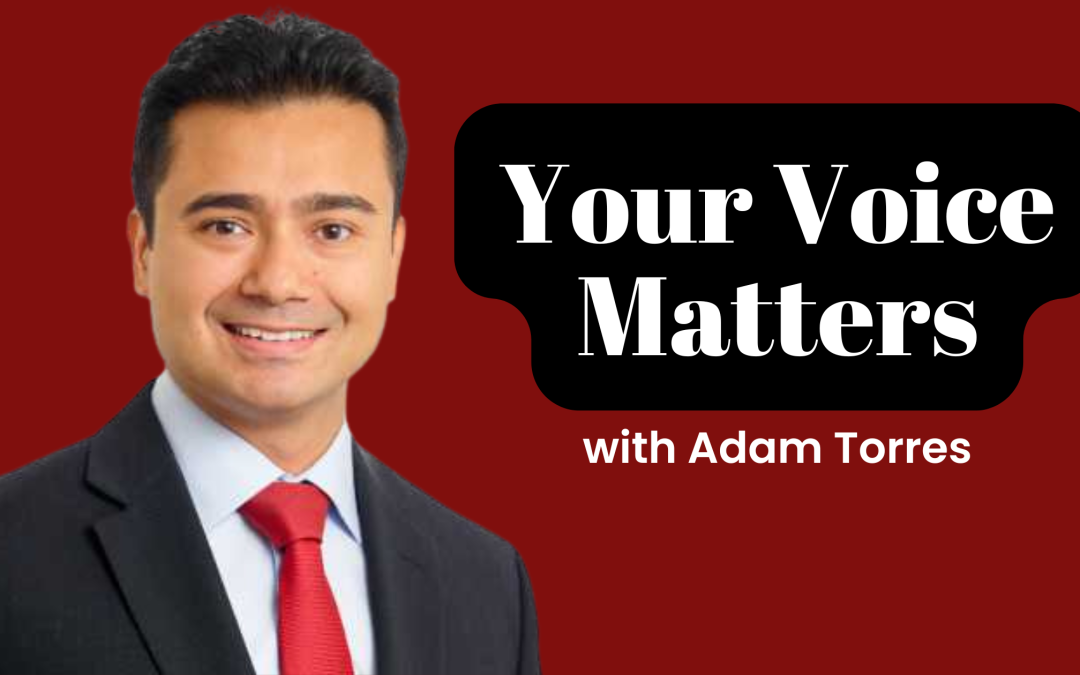Listen to this week’s episode.
Listen to “62. 20 Downloads = 20 Hours: Rethinking Impact with Adam Torres” on Spreaker.
Listen On Your Favorite Podcast App | Watch on YouTube
If you’re a podcaster (or even thinking about becoming one), chances are you’ve had a moment of self-doubt. You release an episode, check your stats, and the number staring back at you feels… underwhelming.
“Only 20 downloads?”
It’s easy to get discouraged. In a world that celebrates going viral, slow and steady can feel like failure. But I want to offer a different lens—one that was deeply affirmed in my recent conversation with Adam Torres, host of the Mission Matters podcast series and founder of a branding and publishing agency by the same name.

Adam has conducted over 6,000 interviews, launched more than 250 shows, and published 400+ authors. On paper, he’s achieved what many entrepreneurs and creators dream of. But what struck me most wasn’t his credentials—it was his perspective.
“If 20 people download your episode, and it’s an hour long, that’s 20 hours of someone’s life you’ve earned.”
Whew. Let that sit for a minute.
The Power of Earning Time
Adam reminded me of something that’s easy to forget in the grind of content creation: people are giving us their time.
Think about the weight of that. In a world full of distractions, people are choosing to listen to you. Not scroll past you. Not double-tap and keep it moving. Listen.
If you get 100 downloads, that’s like standing on a stage, delivering a keynote to a room of 100 people who showed up to hear you speak.
Podcasting isn’t about chasing the algorithm. It’s about building intimacy. One voice at a time.
From Finance to Founding a Media Company
Adam didn’t start off in media. In fact, he spent over a decade in the financial industry before ever picking up a mic. But when his mentor encouraged him to write a book, something shifted.
He didn’t think his story mattered. He wasn’t a celebrity or an athlete with a made-for-TV journey. But he wrote it anyway—and to his surprise, people did care. That one book led to speaking engagements, international travel, and a growing demand for him to help others tell their stories too.
And so began the seeds of Mission Matters.
“I didn’t know how to publish a book. I wasn’t trying to start a media company. I was just listening—to people, to the need, and to God.”
There’s something deeply refreshing about that kind of obedience. A willingness to pivot. To start ugly. To say yes, even before all the logistics are clear.
That resonates with me. I’ve pivoted many times over the years—from homeschool consulting to branding and podcasting strategy, to launching an entire collective that centers soulful storytelling. Every chapter required letting go of certainty to embrace calling.
Shut It Down and Start Again
Here’s the part of Adam’s story that had me nearly shout-preaching into the mic:
He originally launched his show under the name Money Matters—it made sense, right? He was coming from finance. But then, during an interview, someone casually said, “Money matters… but mission matters too.”
That phrase hit him like a divine download.
Within days, Adam shut down his entire brand—website, podcast, socials, everything—and relaunched as Mission Matters.
Let me just pause here and say:
That takes guts.
He had already produced 1,500 episodes, built brand equity, and had a functioning system in place. And he still chose to begin again in obedience to the call.
“It made zero sense. But I knew I had to do it. And we were rewarded for that faith.”
This is a word for somebody: sometimes the next level requires you to shut down something that’s working—because it’s not in full alignment anymore.
Legacy Isn’t Likes
As we got deeper into our conversation, Adam shared something personal that brought podcasting into a whole new light.
Last October, he lost his mother unexpectedly. It was devastating. But what he treasures most now? The recordings he has of her voice.
They’d done a few podcast episodes together. He even brought her into a studio once and had friends write questions for her to answer.
Now, those episodes are priceless.
He gets to hear her laugh. Her stories. Her essence.
“Legacy is different for me now. Because I understand what it means to capture someone’s voice and freeze it in time. When you create a podcast, even just one episode, you’re creating something that lives beyond you.”
That hit me hard.
We often think of podcasting as a business tool, a marketing vehicle, a way to grow our reach. And yes, it can be all of that. But it’s also a sacred archive. A digital journal. A gift to the people who will one day want to remember us.
Whether you have 5 downloads or 5,000—you’re making legacy.
Tips for Staying the Course
So what about the practical side? Because let’s be real—consistency is hard. Especially when you feel like you’re talking into the void.
Here are a few tips Adam shared for anyone looking to podcast with longevity in mind:
1. Podcasting is a marathon, not a sprint.
Most new podcasters launch big—trailer, fancy graphics, maybe even a press release. Then they release a few episodes, don’t see immediate traction, and quit.
That’s a sprinter’s mindset. And podcasting will eat you alive if you come in expecting instant results.
The shows that succeed are the ones that stay consistent long enough to hit that “hockey stick” moment—where slow, steady growth suddenly spikes upward.
2. Don’t wait for perfect conditions.
Adam recorded his first 300 episodes on a phone. No fancy mic. No editing.
The most important thing isn’t polish—it’s presence. Get the message out. Tell the story. Capture the moment.
If you’re waiting for the right gear, the right timing, the right space… you might never start.
3. Honor your audience, no matter the size.
This one really stuck with me.
If 20 people listen to your one-hour episode, that’s 20 hours of attention. You could’ve been background noise on a walk, a lifeline on a bad day, or a lightbulb moment for someone stuck in their business.
That’s not small. That’s sacred.
4. Build systems around your show.
For Adam, podcasting is baked into his calendar. He doesn’t “try to find time” to record—he protects the time. That’s why he’s able to stay consistent.
If you want podcasting to become part of your life, you’ve got to treat it like it already is.
Final Thoughts: Show Up Like It Matters
Podcasting has changed my life. I say that not because I’ve hit some magic number or landed a high-profile guest, but because I’ve felt the shift it creates in me—and in those I get to connect with.
It’s made me braver. Bolder. More vulnerable. More me.
And whether you’re just starting or already deep into the journey, I want to remind you of this:
You don’t need millions to matter. You need mission.
And that mission might just be to give someone hope, perspective, or courage—one episode at a time.
So if you’re sitting on that mic, hesitating to press record, remember what Adam said:
“Even if you don’t know your story yet—share it anyway. That’s how you find it.”
🔗 Resources:
- Follow Adam on Instagram: @AskAdamTorres
- Explore Mission Matters: missionmatters.com
Ready to lighten the load and podcast with more soul?
Let’s work together. Learn more about our services at Soul Podcasting Collective or book a discovery call to see how we can support you.
Let’s podcast with purpose. Let’s create legacy. Let’s keep it soulful.
- 82. How to Keep Listeners Hooked: Neuroscience Secrets for Podcasters with Aurora Winter - October 23, 2025
- 81. Podcast Setup for Beginners - October 12, 2025
- 80. Podcast Growth Hacks: How I Actually Grew My Podcast in 2025 - October 5, 2025

